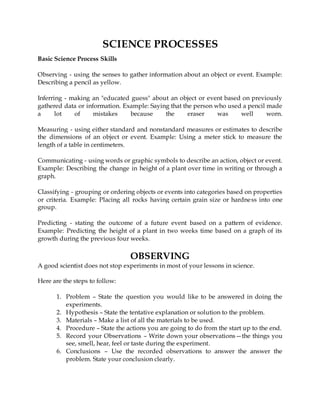
Science processes
- 1. SCIENCE PROCESSES Basic Science Process Skills Observing - using the senses to gather information about an object or event. Example: Describing a pencil as yellow. Inferring - making an "educated guess" about an object or event based on previously gathered data or information. Example: Saying that the person who used a pencil made a lot of mistakes because the eraser was well worn. Measuring - using either standard and nonstandard measures or estimates to describe the dimensions of an object or event. Example: Using a meter stick to measure the length of a table in centimeters. Communicating - using words or graphic symbols to describe an action, object or event. Example: Describing the change in height of a plant over time in writing or through a graph. Classifying - grouping or ordering objects or events into categories based on properties or criteria. Example: Placing all rocks having certain grain size or hardness into one group. Predicting - stating the outcome of a future event based on a pattern of evidence. Example: Predicting the height of a plant in two weeks time based on a graph of its growth during the previous four weeks. OBSERVING A good scientist does not stop experiments in most of your lessons in science. Here are the steps to follow: 1. Problem – State the question you would like to be answered in doing the experiments. 2. Hypothesis – State the tentative explanation or solution to the problem. 3. Materials – Make a list of all the materials to be used. 4. Procedure – State the actions you are going to do from the start up to the end. 5. Record your Observations – Write down your observations—the things you see, smell, hear, feel or taste during the experiment. 6. Conclusions – Use the recorded observations to answer the answer the problem. State your conclusion clearly.
- 2. Sensing Problems You become aware of a problem when you observe something and think about it. You work an explanation for it. For example, while taking a shower, you notice that the shower curtain move toward to you. You ask yourself, “Why does the shower curtain move toward me and not away from me?” By observing that the curtain moves, you sense a problem that needs an explanation. By wondering about why the curtain moves the way it does, you identified a problem. A problem may come up at any place, any time. It is a situation that needs an explanation. You can identify a problem if you are a keen observer and if you ask question. You can tell the color, size, shape, texture, temperature and other characteristics of things by observing. Hypothesis A good hypothesis suggests a way by which you can test whether the temporary explanation is right or wrong. For the problem above, you may want to ask some rose growers what fertilizer on your rose plants. You follow your plan and observe the results. A hypothesis is a temporary explanation or solution to a problem. It may be accepted or rejected. A hypothesis needs to be tested. Conducting an experiment is way of testing a hypothesis. When a hypothesis is rejected, another hypothesis may be tested. Experimenting These show that some factors such as plant variety and size, amount and kind of soil and sunlight are controlled. We call these the controlled variables or the constant variables. In conducting an experiment, some variables are controlled and one variable is experimental. Controlling variables helps determine the effect of the experimental variable. Recording and Interpreting Data Data organized in table form are easier to analyze. You can readily see changes, similarities or differences from the data. You can make conclusions which are supported by data. Observing and recording data while experimenting are important. Recorded data provide a basis for making comparisons and conclusions.